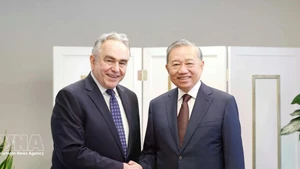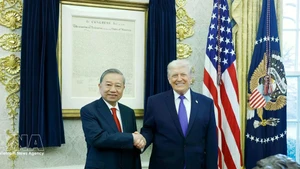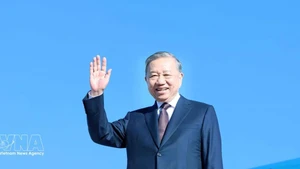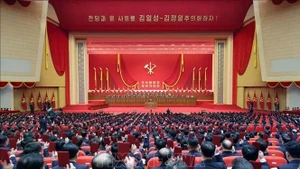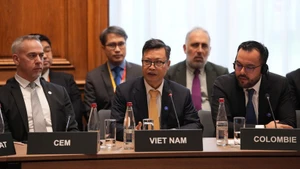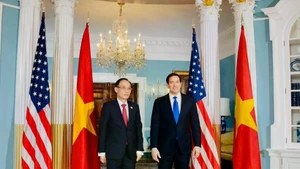They shared the view that the Vietnam - UK strategic dialogue has been developing intensively and comprehensively in all spheres and on both bilateral and multilateral dimensions, especially with the strategic partnership established in 2010 and the 2020 joint statement identifying nine priority areas, showing the countries’ strong determination to elevate bilateral relations.
Political trust has been enhanced through the maintenance of all-level mutual visits and via all channels, including President Vo Van Thuong’s recent attendance in the coronation of King Charles III in May 2023, Prime Minister Pham Minh Chinh’s meeting with his British counterpart Rishi Sunak on the sidelines of the expanded G7 summit also in May, and National Assembly Chairman Vuong Dinh Hue’s official visit to the UK in July 2022.
Economic and trade links have been unceasingly expanded on the basis of the UK - Vietnam Free Trade Agreement (UKVFTA), and security and defence cooperation continued to be promoted substantively. Meanwhile, people-to-people exchanges, including educational links, remain a bright spot as there are more than 12,000 Vietnamese students in the UK.
Vietnam attaches importance to the reinforcement of the countries’ strategic partnership, Hang affirmed.
She suggested both sides keep bringing into play the positive cooperation results in politics, economy, education - training, security - defence, and people-to-people ties and expand collaboration to new areas that match the UK’s strength and Vietnam’s demand such as new energy, green finance, and strategic infrastructure.
For her part, Trevelyan stated Vietnam is an important partner in the British Government’s Indo-Pacific strategy.
The UK welcomes Vietnam’s strong commitment to achieve net zero emissions by 2050 made at the 26th UN Climate Change Conference (COP26), along with the Southeast Asian country’s adoption of a political declaration on just energy transition with the G7. It is ready to join international partners and private businesses in cooperating with and assisting Vietnam in green transition, sustainable development, and climate change response, she affirmed.
To further intensify the strategic partnership and tap into cooperation potential, the two sides agreed to step up delegation exchanges at all levels, especially high levels; effectively maintain bilateral cooperation mechanisms; work together to implement the UKVFTA to raise bilateral trade; and encourage British enterprises to boost investment in Vietnam in such fields as renewable energy, digital technology, finance - banking, innovation, and high-quality infrastructure.
They also discussed measures for further strengthening partnerships in science - technique and education - training, including exchanging students, conducting joint studies, increasing the UK’s scholarships for Vietnamese students, and effectively using the UK’s sponsorships for scientific researches.
In terms of security cooperation, Vietnam and the UK agreed to keep close coordination in the fields of migration; exit - entry; the fight against organised, hi-tech, and human trafficking crimes; and capacity building for law enforcement officers.
Regarding defence ties, they expressed their delight at the progress in bilateral cooperation as seen in a British naval ship’s visit to Vietnam and the UK’s assistance in training Vietnamese officers for United Nations peacekeeping operations. They agreed to continue increasing defence delegation exchanges, step up cooperation in UN peacekeeping operations, share strategic research information, and expand collaboration to such potential areas as cyber and maritime security safeguarding.
On the basis of the common priorities in agricultural partnership and many important agreements on this regard, the two officials discussed measures to foster cooperation in opening their countries’ markets to each other’s agricultural products, facilitating timber trade, controlling food quality and safety, reducing greenhouse gas emissions in agriculture, and boosting the possibility of trilateral partnerships to help guarantee global food security.
Discussing bilateral coordination at international and regional forums, Trevelyan appreciated Vietnam’s support for the UK during the negotiations on her country’s participation in the Comprehensive and Progressive Agreement for Trans-Pacific Partnership (CPTPP).
Both sides agreed to bolster view sharing and coordination at multilateral forums like the UN and the ASEAN - UK cooperation.
Touching upon some international and regional issues of common concern, they stressed the importance of complying with international law and the fundamental principles of the UN Charter. They voiced support for ASEAN’s centrality and the bloc’s stance on regional security issues, including ensuring security, safety, and freedom of navigation and overflight in the East Sea; respecting law, especially the 1982 UN Convention on the Law of the Sea (UNCLOS); and advocating the building of an efficient and effective code of conduct in the waters.
Also on June 12, Deputy Minister Hang had a meeting with Deputy Speaker of the UK’s House of Commons Nigel Evans, who applauded the countries’ flourishing relations and described the strategic dialogue as an important mechanism for comprehensively discussing issues of bilateral cooperation.
He stressed Vietnam is a partner of leading importance of the UK in the region, and that the British parliament supports the enhancement of their ties.
Hang appreciated the support from the Royal Family, Government, and parliament of the UK for Vietnam, and called for continued assistance for the Vietnamese community in the European country.
The two sides also agreed to work together to organise celebrations of the 50th anniversary of their countries’ diplomatic relations this year.
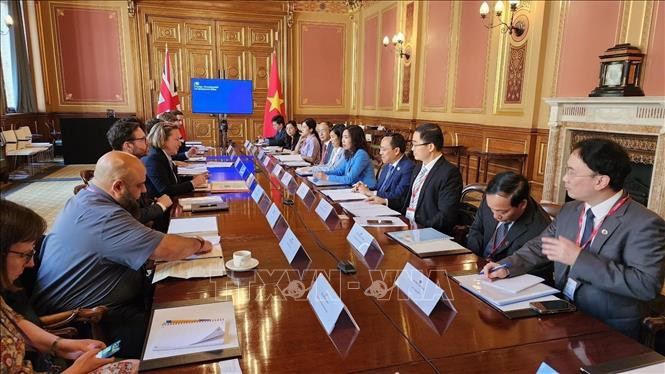
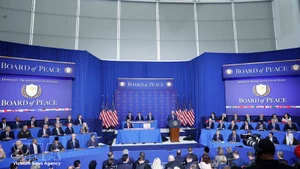
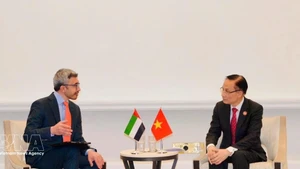
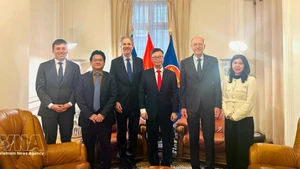
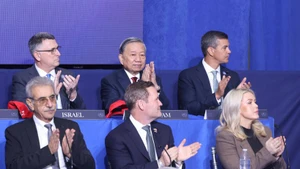
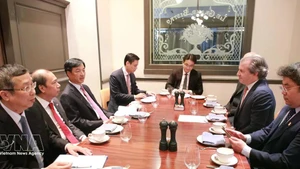
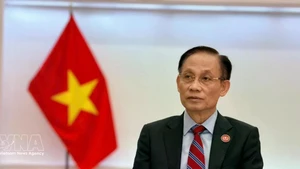
![[In pictures] Party General Secretary To Lam meets US President Donald Trump](https://en-cdn.nhandan.vn/images/dcd63867a0eed4c7753eb4bfb346593abc1ce710dfab8ad1b9aebd75ea6bf930b2ea13e4664779d689ba40aadd80f76d5d05d1208720fd7b0d811ace3a3297321c78cf738400e136e3f2d8790b24d43646e46edbe19517144a88f6ffb0d528f153574a7109328cc0949e4a4c16433c2ff751541639eefe4490518227264cbf8e/vna-potal-tong-bi-thu-to-lam-gap-tong-thong-hoa-ky-donald-trump-8599945.jpg.webp)
